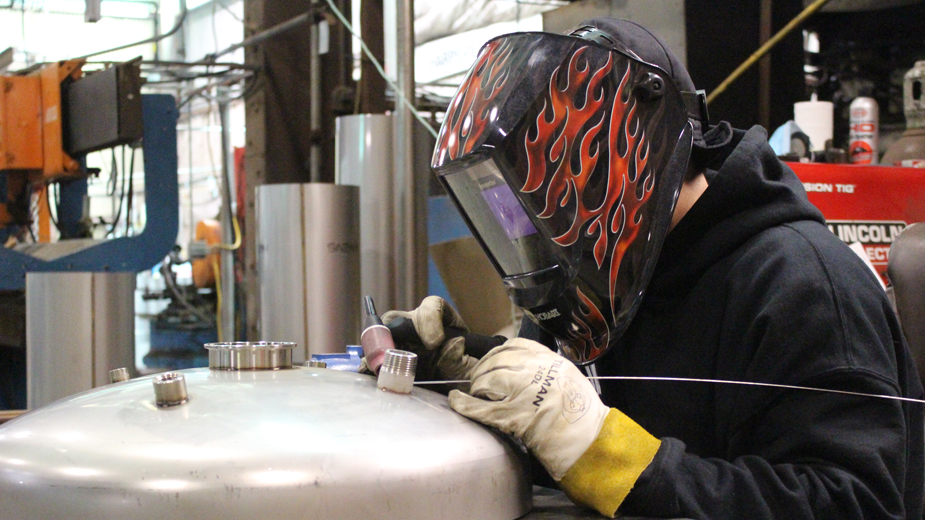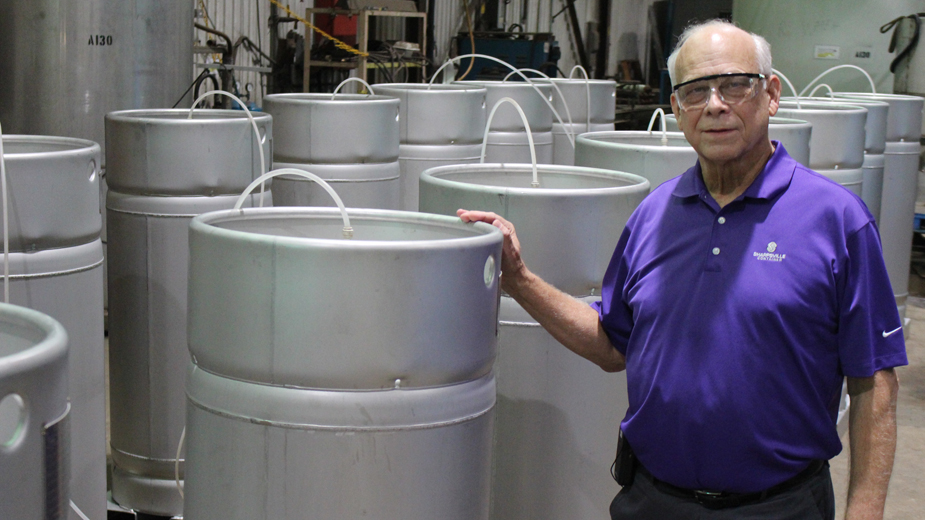SHARPSVILLE, Pa. – A company in Sharpsville, Pa., is doing its part in the fight against COVID-19, as researchers race against time to produce a vaccine against a relentless pandemic that has so far claimed the lives of more than one million people worldwide.
“We were selected to provide vessels used in the manufacturing process of COVID-19 vaccines,” says Michael Lewis, president and CEO of Sharpsville Container Corp. “We shipped the first five of these vessels on Oct. 15. So there’s still many more to come.”
Rates of infection across the United States have surged over the last several weeks, according to data provided by the Centers for Disease Control. Since January, more than 8.2 million people in the United States have become infected and more than 225,000 have died from the disease caused by the coronavirus.
The rate of infection underscores the importance of scientists delivering a vaccine approved by the U.S. Food and Drug Administration as quickly as possible.
Spearheading this effort is Operation Warp Speed, an initiative commissioned by the Trump administration to accelerate development and deployment of effective countermeasures to COVID-19.
The goal is to deliver 300 million doses of effective vaccines with the initial doses made available by January 2021. To that end, Congress has approved nearly $10 billion to fast track the effort.
At the same time, the administration invoked the Defense Production Act to stimulate researchers, suppliers and manufacturers toward the successful production of a vaccine that participate in the supply chain – and one of Sharpsville Container’s customers came calling.
“That’s how this whole thing started,” Lewis says. “Our customers are bound by this. And that priority rating flows all the way through to our suppliers.”
Sharpsville Container has a long history of manufacturing and fabricating various types of metal containers for customers in the chemical, food and beverage, pharmaceutical and compressed gas markets.
For the COVID-19 project, the company was contracted by a customer in the chemicals industry to manufacture vessels to hold and transport pure alcohol. The alcohol will be used to sanitize and remove contaminants during the production of the vaccine, says Chuck Bachorski, director of market development.
“We’ve been working with them for the past two to three years and they have strategically pursued opportunities in the bio-science sector,” he says. Thus far, the company has orders for 107 such vessels.
“We’re basically a packaging supplier for someone that supplies a critical material during the manufacturing process of the vaccine,” Lewis says.
The real challenge for the company wasn’t manufacturing the vessels, Lewis says. Rather, it was aligning Sharpsville Container’s suppliers so they could provide the company with the steel, valves, fittings and services necessary so it could ramp up production at lighting speed.
“The delivery window was squeezed from months to weeks,” Lewis says.
With the full support and cooperation of its suppliers, Sharpsville Container was able to turn out its first vessels within two weeks after it received the purchase order.
“Normally, it takes 16 to 20 weeks to deliver such a vessel. The trick was to reduce lead time by 90%,” he says.
These containers – which resemble extra-tall beer kegs and stand about four feet in height – are manufactured from stainless steel and undergo a rigorous testing and inspection, Lewis says. That’s because the end users are the large pharmaceutical companies such as Pfizer, Moderna and AstraZeneca, which are all engaged in late-stage clinical trials of COVID-19 vaccines in the United States.
“There’s no approval on a vaccine yet,” Lewis notes. “The intent was always to produce the vaccines ahead of any approval so that once it’s attained, they’re ready to go. It’s actually a privilege to be involved in the whole thing.”
Stainless steel is shipped in from suppliers and once rolled, forms the round body of the vessel. Simultaneously, another operation is forming the tank heads and bottom pieces of the container. A separate operation fits these components together with small spot welds before it undergoes final welding.
Welding stainless steel requires a different skill set than traditional methods, says Mike Anzur, a welder. Sharpsville Container uses an automatic welder equipped with vertical and horizontal controls. “The welder will follow the seam all around,” he says.

Once the parts are welded and the vessel formed, it is sent to an outside supplier to undergo electro-polishing that produces a smooth interior and exterior.
The vessels are then returned to Sharpsville Container where they are run through hydrostatic testing.
“We fill each vessel with water and bring it up to a certain pressure to make sure there aren’t any leaks,” Lewis says. An on-site inspector certified by the American Society of Mechanical Engineers then examines the vessel before it is shipped to the customer.
“He inspects all your work, verifies it against the written standard and signs off that these are made according to code,” Lewis explains. The vessels used in these orders must adhere to both ASME and U.S. Department of Transportation standards. An in-house U.S. DOT inspector carries out tests during the day to ensure the shipping vessels comply.
Sharpsville Container was established in 1870. Its roots date back a decade earlier to the Civil War. Metal fabricated at the company was reportedly used to manufacture components for the USS Monitor in 1862, the U.S. Navy’s first ironclad warship. It also manufactured the tanks used for the Drake Well, the first commercial oil well in the United States drilled in 1859 in Titusville, Pa.
Among the largest vessels ever constructed at the plant were 65-foot-high silos used by a customer in the food and beverage industry, Lewis says.
The onset of COVID-19 presented its own set of new challenges for the company. Early in the pandemic, Sharpsville Container was deemed an essential business because it supplied components the medical industry uses and emergency vehicles. “It was determined that we stay open,” Lewis says.
However, the company, which employs between 45 and 50, did feel the pinch as many of its customers were shut down. While Sharpsville Container continued to work on previously booked projects, “there wasn’t any new business coming in,” he says.
Yet the pandemic has also opened up additional prospects as evidenced by new orders for vessels used to hold hand sanitizer and for use in the manufacture of COVID-19 test-kits, Lewis says.
There is also an upswing in orders for syrup tanks that supply the fast-food industry, since COVID has forced many patrons to change their dining habits for quick takeout rather than dine-in, Bachorski notes. “We’re starting to see some green shoots.”
Despite the somber numbers related to COVID, Lewis says his company stands as an example that efforts are moving forward to tackle this disease.
“It kind of gives people hope. There is action going on and things coming down the pipeline,” he says. “This is a war against a virus.”
Pictured: Michael Lewis shows vessels that will be used in the manufacturing process for a Covid-19 vaccine.
